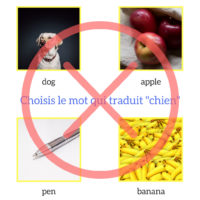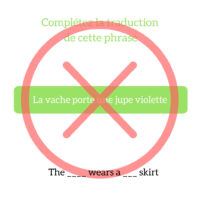Time is a precious commodity, and not having enough of it is a common complaint from language learners. Unfortunately, many traditional language-learning methods ignore this, and you end up wasting your time with ineffective approaches. Learning a new language takes time, but that doesn’t mean you shouldn’t aim to be as efficient as possible. In this article, we’ll teach you how to tell the difference between exercises and approaches that make great use of your time, and those that will just waste it.

Learning… Or Just Fooling Around?
As you know, there are a wide variety of methods available today when it comes to learning a foreign language. On the one hand, this is a really fantastic thing. As Luca explains in our video, “Is Learning a Language Easy or Hard?”, there’s never been so many useful and accessible resources out there.
On the other hand, language learning has become a big industry, one that is more and more competitive. Unfortunately, more than a few language learning sites and apps have chosen to promote approaches that are easy to sell… but not all that effective.
What do you think is easier to sell?
- An approach that’s easy and fun, giving users the impression that they’re making progress, but in which the lessons and learning methods aren’t very effective.
- An approach that’s effective and well-organized, and genuinely helps users improve, but which requires them to put in the work.
Unfortunately, while the second option is far more useful, the first option sells much better.
Let’s Play a Game…
Multiple-choice questions
Imagine you’d like to learn a language, say French. Take the image on the left, with four pictures. Can you tell me what “chien” means in French?
No big surprise, the answer is “dog.” This kind of approach appeals to people because it’s easy, and you feel you’re already doing a great job. You can whiz your way through hundreds of these pictures, and feel like you’ve just learned a ton of new words.
This is the trouble with multiple-choice questions. Teachers use them a lot because they’re easy to grade… but it’s not a very effective way to learn or memorize new vocabulary. It’s easy because the word is presented to you, so you don’t really have to remember it, you just have to pick the right one. In other words, there’s no active recall involved since the answer is right in front of you.
Memory games
Let’s try another one. Here you have a phrase that you have to translate from French to English. In many cases, you can even pick from a selection of words. In this case, however, there are two main problems:
- The sentence doesn’t make sense, and we’re never going to use it. In French, it reads: “The cow wears a purple skirt.” We hate to say it, but this example comes from one of the most popular apps out there. The problem is that we don’t learn as well when the sentences and examples are nonsensical. It makes it harder to connect the lesson to our own experiences and is thus less effective.
- The activity is too easy to be useful for advanced learners, as most of the words have been given. Very little translation is needed, and you can tell from context that one is a noun and the other an adjective. It’s also not well adapted to beginners, who need to concentrate on listening and vocabulary memorization.
The above examples aren’t a great use of your time, because they’re not a very effective way of learning. However, they do supply a false sense of progress. You can make your way through the exercises without having to think about it too much, which makes it fun and satisfying… But not very useful.
A (False) Sense of Progress
Most subjective indicators of progress, like answering questions easily, moving smoothly through lessons, and storing information in your short-term memory, are misleading. Feeling like you’re making progress, unfortunately, doesn’t mean that you really are. This is something we explored in our MosaLingua vs. DuoLingo article.
As it turns out, the more difficult an exercise is, the better able you are to recall the knowledge later on. Exercises that require effort and that you can’t simply breeze through one after another are actually far more effective, and the words you learn will more quickly enter your long-term memory. (See, for example, the work by Dr. A. Bjork from the University of California1).
In the end, you may feel like you’re making great time, because you can fly through the exercises — but in the end, it’s actually a big time-waster, since you learn far less effectively.
So, is it possible to learn and have fun?
Definitely! Learning a language doesn’t have to be a chore. When we say it requires effort, this shouldn’t deter you. Playing football, going for a hike, learning to surf — these are all things that take effort, but are still fun and rewarding.
However, it’s important to keep the focus on learning. The more distracting elements there are, and the less effective the actual learning will be. Most learning methods that focus on instant gratification, constant rewards, and fun images and sounds, are actually doing you more harm than good. The game eclipses any real progress. While fun, your brain is engaged in playing the game and winning — not learning. Research has also shown that time limits and countdowns generate stress, which hinders your ability to learn.
In fact, research has shown that stress increases your short-term memory, but ultimately stops information from reaching your long term memory. So you feel like you’ve memorized a new word… but in just a few days, it will be gone.2 We discuss this in greater detail in our article about Why MosaLingua Is Not a Game.
A growing tendency in the commercial education sector is to include games in learning methods, something that’s been aptly named gamification. The idea is to use the addictive power of games to teach new things. It’s not a bad idea, in principle, but it’s been taken to extremes.
There are lots of far more interesting ways to add a fun dimension to your learning, without resorting to ineffective and counterproductive games. As we often say: movies, TV series, books and comic books, podcasts, music, these are all fantastic resources for learning a language.
Video: How to Detect Approaches that Will Waste Your Time
Abbe recently spoke to these learning methods in a video, which you can watch below or on our YouTube channel. It’s in English, with subtitles in several languages. You can add subtitles and change the playback speed by clicking on the Settings icons.
Subscribe to our YouTube channel for more tips and videos
How to Tell if an Approach or Exercise Will Help you Learn a Language… or Just Waste Your Time
One of the goals of this article is to help you determine which exercises will be useful to you and which will waste your time. Here are some of the things you should watch out for:
- Multiple-choice questions, especially those where the incorrect responses are obviously false
- Memory games
- Activities which may inhibit the learning process by producing stress, like timers or countdowns
- Games which have little or nothing to do with the language you’re learning
- Anything that seems too good to be true!
Now it’s up to you how you’d like to spend your time: one hour per day using a method that makes you feel like you’re making progress, and emphasizes fun and gratification, or 10 minutes per day using a method that requires effort and concentration, but which genuinely helps you improve.
MosaLingua’s approach
If you think the second option is better, we agree with you. That’s the way we built our apps and courses. Our only intention is to provide you with the most efficient possible way to learn a new language. That’s why we’re constantly updating our methods with new research and learning techniques, and we test every new product or idea that comes onto the market.
If we find something effective, we add it to MosaLingua. We decided to concentrate on results and efficiency more so than fun and distraction, because our goal is to make better use of your time, and to help you as much as possible, as quickly as possible.
All our activities are optional. This way, you can skip exercises and flashcards that aren’t useful to your particular goal or objective. If you have more time or want to make progress more quickly, you can also take advantage of the many ways to immerse yourself in a language that can be a ton of fun. Like chatting with a language partner, watching a TV series in your target language, or reading a comic book.
We know your time is precious; we’ll help you not waste a second of it.
After all, our best advertisement is the rapid progress made by MosaLingua users. Thank you, to the 10 million MosaLingua learners who have downloaded our apps, and especially those who have rated us and left a review on iTunes and Google Play.
- Here’s another article that may interest you: Why Isn’t MosaLingua Free?
1 – Bjork, R. A., & Kroll, J. F. (2015). Desirable difficulties in vocabulary learning. American Journal of Psychology, 128, 241-252.
2 – Vogel, S., Schwabe, L. Learning and memory under stress: implications for the classroom. npj Science of Learning 1, 16011 (2016). https://doi.org/10.1038/npjscilearn.2016.11
Related posts:
Start learning a new language today

Good news: we can help!
More good news: you can get started for free! Start your free trial now and for the next 15 days, take advantage of the most effective language learning method on the market!
Vocabulary flashcards, videos with subtitles, audiobooks, articles adapted to your level – with MosaLingua Premium (Web & Mobile), you’ll have access to all this and more. Get started right now. It’s free—and risk-free—to try!






Comments